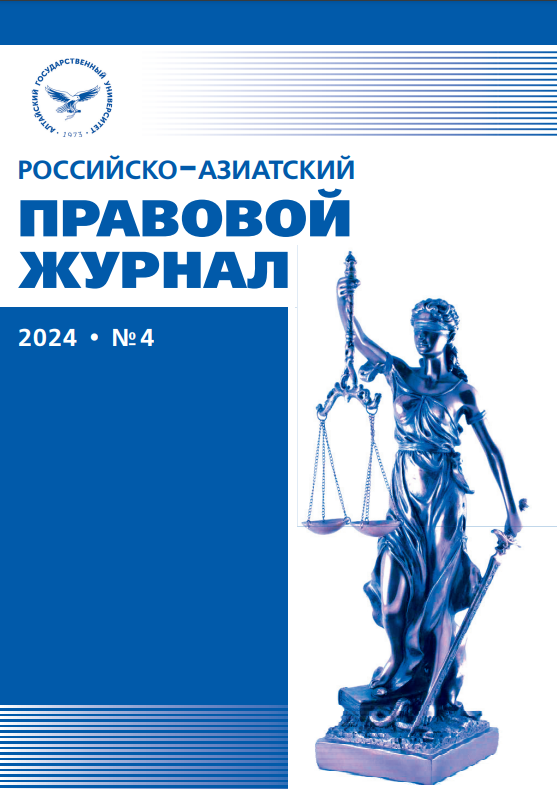DUTIES OF AUTHORITIES, DETERMINED BY THE SPECIFICS OF CONDUCTING AN INQUIRY IN A CRIMINAL CASE IN ABBREVIATED FORM
УДК 343.1 ББК 67.4
Abstract
The article critically analyzes certain provisions of the current criminal procedure legislation governingthe investigation of a criminal case in the form of abbreviated inquiry. It defines the actual duties of theparticipants in the inquiry in abbreviated form in a criminal case, conditioned by the peculiarities of the formof inquiry under consideration. Proposals are formulated aimed at improving the means ensuring the proper performance of duties by the authorities participating in the inquiry in abbreviated form. The peculiarities ofthe inquiry procedure in abbreviated form, the peculiarities of the procedural deadlines for making decisionsand performing procedural actions during the abbreviated inquiry, as well as the peculiarities of truncatedproof in criminal cases, the investigation of which is carried out in the form of abbreviated inquiry, areestablished and disclosed. The problems of the criminal procedure institute of abbreviated inquiry, whichare at the theoretical, normative and applied levels, are identified.
Downloads
References
Кальницкий В.В., Муравьев К.В., Воронов Д.А. Концепция дознания в сокращенной форме: достижения и вопросы совершенствования // Уголовное право. 2013. №3. С. 81–85.
Ткачева Е.С. Дознание в сокращенной форме — упрощение досудебного производства // Научный вестник Омской академии МВД России. 2014. №1 (52). С. 67–71.
Насонова И.А., Зотова М.В. Условия дознания в сокращенной форме и проблемы их совершенствования // Общество и право. 2017. №2 (60). С. 141–148.
Зотова М.В. Дознание в сокращенной форме в российском уголовном процессе: дис. … канд. юрид. наук. Воронеж, 2016. 237 с.
Ярыгина Л.А. Доказывание при производстве дознания в сокращенной форме: дис. … канд. юрид. наук. Самара, 2017. 252 с.
Петухов Е.Н. Механизм обеспечения надлежащего исполнения обязанностей участниками уголовного судопроизводства : автореф. дис. … д-ра юрид. наук. Уфа, 2024. 46 с.
Тогушова И.С. Особенности производства дознания в сокращенной форме // Центральный научный вестник. 2016. Т. 1, №16. С. 54–57.
Доля Е.А. Особенности доказывания при производстве дознания в сокращенной форме // Российский судья. 2013. №6. С. 43–46.
Гаджирамазанова П.К., Бийгишиев З.М. Особенности доказывания при производстве дознания в сокращенной форме // Юридический вестник ДГУ. 2015. №2. С. 128–138.
Торовков А.А. Некоторые особенности приостановления предварительного расследования при производстве дознания в сокращенной форме // Актуальные проблемы борьбы с преступлениями и иными правонарушениями. 2019. №19–1. С. 75–76.
Кругликов А. П. Дознание в сокращенной форме: почему органам дознания и суду можно не исследовать должным образом доказательства при расследовании и рассмотрении уголовного дела // Дознание в сокращенной форме: вопросы законодательной регламентации и проблемы правоприменения: сб. ст. Волгоград, 2013. С. 58–73.
Качалова О.В. Ускоренные производства в уголовном процессе: есть ли предел дифференциации уголовного судопроизводства? // Актуальные проблемы российского права. 2016. №1. С. 141–149.
Калугин А.Г. Доказывание при осуществлении производства по уголовному делу в сокращенных формах: оптимизация или упрощение? // Актуальные проблемы российского права. 2015. №12. С. 147–154.
Расулова Н.С., Журавлева Н.М. К вопросу о значении заключения специалиста по уголовным делам, расследуемым с применением дознания в сокращенной форме // Уголовно -процессуальные проблемы расследования уголовных дел: сб. материалов межведомственной конференции. Екатеринбург, 2017. С. 29–33.
Copyright (c) 2024 Л.В. Бертовский, Е.Н. Петухов

This work is licensed under a Creative Commons Attribution 4.0 International License.
Russian-Asian Law Journal is a golden publisher, as we allow self-archiving, but most importantly we are fully transparent about your rights.
Authors may present and discuss their findings ahead of publication: at scientific conferences, on preprint servers, in public databases, and in blogs, wikis, tweets, and other informal communication channels.
Russian-Asian Law Journal allows authors to deposit manuscripts (currently under review or those for intended submission) in non-commercial, pre-print servers such as ArXiv.
Authors who publish with this journal agree to the following terms:
- Authors retain copyright and grant the journal right of first publication with the work simultaneously licensed under a Creative Commons Attribution License that allows others to share the work with an acknowledgement of the work's authorship and initial publication in this journal.
- Authors are able to enter into separate, additional contractual arrangements for the non-exclusive distribution of the journal's published version of the work (e.g., post it to an institutional repository or publish it in a book), with an acknowledgement of its initial publication in this journal.
- Authors are permitted and encouraged to post their work online (e.g., in institutional repositories or on their website) prior to and during the submission process, as it can lead to productive exchanges, as well as earlier and greater citation of published work (See The Effect of Open Access).








